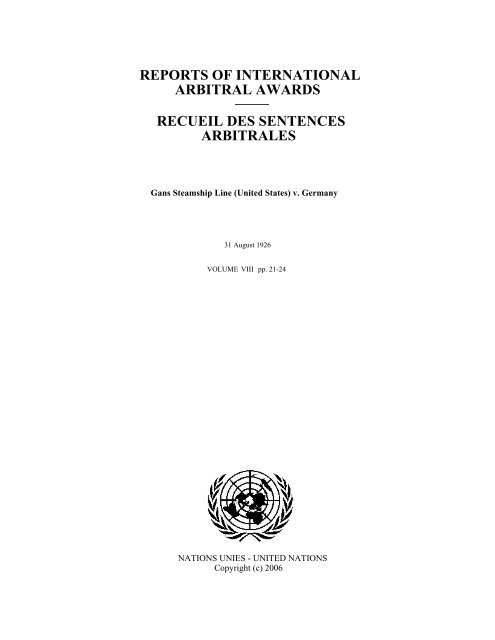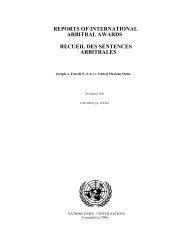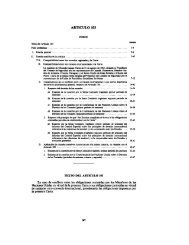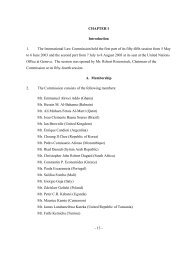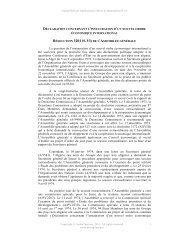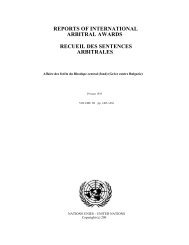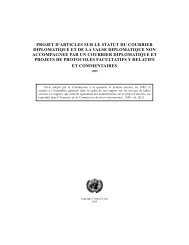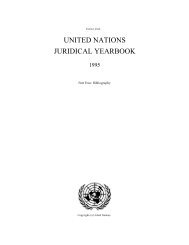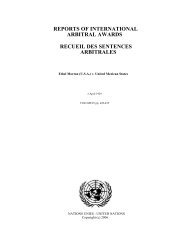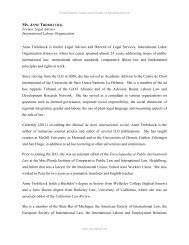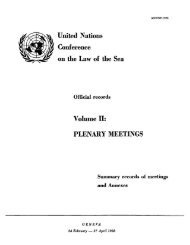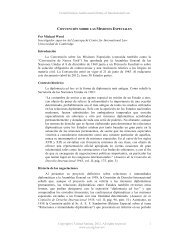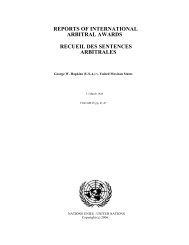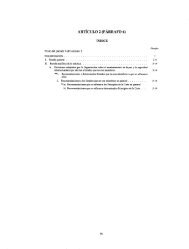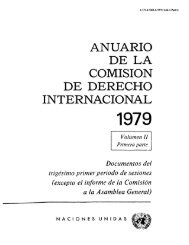Gans Steamship Line - United Nations Treaty Collection
Gans Steamship Line - United Nations Treaty Collection
Gans Steamship Line - United Nations Treaty Collection
Create successful ePaper yourself
Turn your PDF publications into a flip-book with our unique Google optimized e-Paper software.
REPORTS OF INTERNATIONAL<br />
ARBITRAL AWARDS<br />
RECUEIL DES SENTENCES<br />
ARBITRALES<br />
<strong>Gans</strong> <strong>Steamship</strong> <strong>Line</strong> (<strong>United</strong> States) v. Germany<br />
31 August 1926<br />
VOLUME VIII pp. 21-24<br />
NATIONS UNIES - UNITED NATIONS<br />
Copyright (c) 2006
DECISIONS 21<br />
therefore, Germany's act in planting mines was proximate cause of loss.<br />
Agreement between Agents on fair market value of vessel confirmed by<br />
National Commissioners.<br />
(Text of decision omitted.)<br />
GANS STEAMSHIP LINE<br />
(UNITED STATES) v. GERMANY<br />
(August 31, 1926, pp. 832-836.)<br />
EXPROPRIATION OF VESSELS: CHARTERER'S INTEREST IN VESSELS, SOVEREIGN<br />
POWER OF EXPROPRIATION. —DAMAGE: CAUSED IN PROSECUTION OF WAR;<br />
EXCEPTIONAL WAR MEASURES, MEASURES OF TRANSFER. Sixteen German<br />
vessels chartered by claimant between October 26, 1915 and December 18,<br />
1916, to be delivered to her after conclusion of peace, but expropriated by<br />
Germany for transfer in property to Allies free from encumbrances etc. as<br />
required by <strong>Treaty</strong> of Versailles, Part VIII, Section I, Annex III, as carried<br />
into <strong>Treaty</strong> of Berlin. Claim for value of charterer's interest in vessels. Held<br />
that seizure and deprivation of claimant's rights do not fall within terms<br />
of <strong>Treaty</strong> of Berlin: (1) no damage caused in the prosecution of war (reference<br />
made to Administrative Decision No. I, see Vol. VII, p. 21): interest in<br />
vessels, in any case subject to Germany's sovereign power of expropriation,<br />
expropriated in pursuance of terms of peace dictated by victorious powers ;<br />
(2) no exceptional war measures or measures of transfer (<strong>Treaty</strong> of<br />
Versailles, Part X, Section IV, Annex, para. 3).<br />
PARKER, Umpire, rendered the decision of the Commission.<br />
This case is before the Umpire for decision on a certificate of disagreement of<br />
the National Commissioners.<br />
An award in the sum of 56,821,813.74 is sought on behalf of the claimant,<br />
<strong>Gans</strong> <strong>Steamship</strong> <strong>Line</strong>, an American corporation, being the alleged value of its<br />
interest as charterer in sixteen steamships, all owned by German nationals at<br />
the time the charters were entered into. The case presented by the claimant,<br />
briefly stated, is this:<br />
(1) Between October 26, 1915, and December 18, 1916, during the period<br />
of American neutrality, the claimant entered into charter-parties with the<br />
German owners of sixteen German ships varying from a one-way voyage<br />
charter from the <strong>United</strong> States to Europe to twelve-month time charters, to<br />
run from the date of delivery of each vessel thereunder.<br />
(2) In varying forms of expression the charters provided for delivery " after<br />
peace has been concluded and trading for German ships is free in all waters ",<br />
or " after official conclusion of peace ", or " after officially declared conclusion<br />
of peace ", or " after general conclusion of peace ", or similar expression.<br />
(3) At the time the charters were fixed the vessels were tied up at different<br />
ports, among them Hamburg, Luebeck, Antwerp, Bergen, Bilbao, Cadiz, and<br />
Barcelona, and one was building at Stettin, another at Luebeck.<br />
(4) Annex III to Section I of the Reparation Provisions (Part VIII) of the<br />
<strong>Treaty</strong> of Versailles required that " The German Government, on behalf of<br />
themselves and so as to bind all other persons interested, cede to the Allied and<br />
Associated Governments the property in all the German merchant ships ",<br />
described so as to include those on which claimant's charters were fixed. By
22 UNITED STATES/GERMANY<br />
the same annex it was provided that " the German Government will : (a) Deliver<br />
to the Reparation Commission in respect of each vessel a bill of sale or other<br />
document of title evidencing the transfer to the Commission of the entire<br />
property in the vessel, free from all encumbrances, charges and liens of all<br />
kinds, as the Commission may require ".<br />
(5) To fulfill these obligations the German National Assembly on August 31,<br />
1919, enacted a law providing machinery for the acquisition through expropriation<br />
by the German Government of the ships which Germany was required<br />
to deliver to the Allied and Associated Powers through the Reparation Commission.<br />
(6) The memorial filed on behalf of the claimant alleges that " Heretofore<br />
and on various dates during the year 1919 all right, title and interest, including<br />
the rights therein of claimant, to these steamers were seized by the German<br />
Government acting under the obligations assumed by said Government in the<br />
Versailles <strong>Treaty</strong>, Part VIII, Annex III, Section I, and claimant was deprived<br />
of said rights therein by said action."<br />
The defenses put forward by the German Agent are: (1) that the allegations<br />
of the memorial do not bring the claim within the <strong>Treaty</strong> of Berlin; (2) that the<br />
claimant suffered no loss or damage; and (3) that a substantial part of the<br />
stock of the claimant corporation, at the times the charters were entered into<br />
and at all material times since, has been owned by German nationals and to<br />
this extent the claim is not impressed with American nationality.<br />
The first only of these defenses will be considered. The allegation quoted in<br />
the preceding paragraph numbered (6) is the only ground upon which a<br />
recovery is sought against Germany and sharply presents the sole question<br />
certified to the Umpire, viz. : Do the acts of Germany complained of fall<br />
within the terms of the <strong>Treaty</strong> of Berlin?<br />
The Umpire decides that they do not.<br />
The financial obligation of Germany to the <strong>United</strong> States on behalf of its<br />
nationals arising under that <strong>Treaty</strong> with respect to so-called reparation claims<br />
were defined by this Commission in its Administrative Decision No. I. 1 Such<br />
claims are restricted to damages suffered by American nationals caused by<br />
Germany or her agents (or in certain categories by her allies or by any belligerent)<br />
in the prosecution of the war, or, as expressed in Article 231 of the<br />
<strong>Treaty</strong> of Versailles, such " loss and damage to which the Allied and Associated<br />
Governments and their nationals have been subjected as a consequence of the<br />
war imposed upon them by the aggression of Germany and her allies."<br />
Manifestly Germany's acts, of which claimant complains, far from being<br />
acts of aggression, were acts of submission ; far from being acts committed in<br />
the prosecution of the war, were acts performed to carry into effect the terms<br />
of peace imposed upon her by the victorious powers.<br />
Assuming for the purposes of this opinion that the claimant had an interest<br />
in the ships which were expropriated by Germany and delivered to the Allied<br />
Powers through the Reparation Commission in pursuance of the provisions of<br />
the <strong>Treaty</strong> of Versailles, nevertheless that interest was when acquired and<br />
continued to be an interest in German ships subject to the sovereign power of<br />
expropriation by Germany in accordance with her laws. Germany not only<br />
acted within her sovereign power and in strict accordance with her laws but<br />
those very laws were enacted in pursuance of the terms of peace dictated by<br />
the victorious powers. It is not within the competency of this Commission to<br />
adjudicate the right if any to demand compensation which this claimant may<br />
have arising under the German statute of August 31, 1919, as applied by<br />
1 Decisions and Opinions, pages 1-3. (Mote by the Secretariat, Vol. VII, pp. 21-22).
DECISIONS 23<br />
Germany in German territory, which demand must be governed by German<br />
municipal law, administered by German domestic tribunals, which are clothed<br />
with the exclusive power to administer justice within German territory where,<br />
as in this case, this sovereign power has not been expressly surrendered to an<br />
international tribunal or other agency.<br />
But is it urged that if this is not a reparation claim as defined in Administrative<br />
Decision No. I it nevertheless falls within a category expressly excepted from<br />
that decision but embraced within the <strong>Treaty</strong>, namely, " claims arising out of<br />
the application of either exceptional war measures or measures of transfer as<br />
defined in paragraph 3 of the Annex to Section IV of Part X of the <strong>Treaty</strong> of<br />
Versailles." This contention is rejected.<br />
Germany was required by Article 297 (a) of the <strong>Treaty</strong> immediately to<br />
discontinue and stay all exceptional war measures and measures of transfer<br />
with respect to the property, rights, and interests of nationals of the Allied or<br />
Associated Powers, and all such measures taken by Germany or the German<br />
authorities subsequent to November 11, 1918, were declared void (see 2nd<br />
clause of paragraph 1 of the annex last cited). So much of the <strong>Treaty</strong> definitions<br />
of these measures as are prospective in their scope apply to the Allied and<br />
Associated Powers but not not to Germany. But Annex III to Section I of<br />
part VIII of this same <strong>Treaty</strong>, in pursuance of which the acts of Germany here<br />
complained of were taken, compelled " The German Government, on behalf of<br />
themselves and so as to bind all other persons interested," to cede to the Allied<br />
Powers the German ships chartered by claimant. Reading these provisions<br />
together, it is manifest that the measures taken by Germany and here complained<br />
of were not exceptional war measures or measures of transfer, as those<br />
terms are defined in the <strong>Treaty</strong> which expressly stripped Germany of the<br />
power to take such measures subsequent to November 11, 1918. As heretofore<br />
pointed out, they were measures looking toward peace, not measures of war.<br />
But it is urged that Article 304 of the <strong>Treaty</strong> of Versailles (carried by reference<br />
into the <strong>Treaty</strong> of Berlin) clearly confers jurisdiction on this Commission to<br />
adjudicate this claim. The particular provision of that article relied on reads:<br />
" In addition, all questions, whatsoever their nature, relating to contracts concluded<br />
before the coming into force of the present <strong>Treaty</strong> between nationals of the<br />
Allied and Associated Powers and German nationals shall be decided by the Mixed<br />
Arbitral Tribunal."<br />
The relevancy of this provision as applied to this case is not apparent. It is<br />
unnecessary here to determine whether this provision is restricted to claims<br />
arising between nationals of the Allied and Associated Powers and German<br />
nationals which are within the competency of the Mixed Arbitral Tribunals<br />
constituted under the <strong>Treaty</strong> of Versailles or whether it also embraces claims<br />
against the German Government. It will be noted in passing that many of the<br />
provisions of the <strong>Treaty</strong> of Versailles with respect to contracts concluded<br />
between former enemies (section V of Part X) have no application to the<br />
<strong>United</strong> States or its nationals (see Article 299 (c)).<br />
This claim is put forward on behalf of an American national against the<br />
German Government. The agreement between the <strong>United</strong> States and Germany<br />
in pursuance of which this Commission is constituted confers jurisdiction<br />
on it to adjudicate all claims falling within those terms of the <strong>Treaty</strong> of Berlin<br />
which define the pecuniary obligations of Germany to the <strong>United</strong> States and<br />
its nationals. The only question here presented is, Under the <strong>Treaty</strong> of Berlin<br />
is Germany obligated to compensate this claimant for the damages which it<br />
alleges it sustained? This Commission has jurisdiction to decide this question<br />
and, if answered in the affirmative, to assess the damage. A negative answer
24 UNITED STATES/GERMANY<br />
has already been given. Hence it follows that the demand, if any, not based<br />
on any provision of that <strong>Treaty</strong>, which claimant may have against Germany<br />
or anyone else does not fall within the jurisdiction of this Commission.<br />
Wherefore the Commission decrees that under the <strong>Treaty</strong> of Berlin of<br />
August 25, 1921, and in accordance with its terms the Government of Germany<br />
is not obligated to pay to the Government of the <strong>United</strong> States any amount on<br />
behalf of the claimant herein on account of the acts herein complained of.<br />
Done at Washington August 31, 1926.<br />
Edwin B. PARKER<br />
Umpire<br />
S. STANWOOD MENKEN, ADMINISTRATOR OF THE ESTATE OF<br />
ALICE E. TESSON, DECEASED, AND OTHERS<br />
(UNITED STATES) v. GERMANY<br />
ANDREW C. McGOWIN, ADMINISTRATOR OF THE ESTATE OF<br />
FRANK B. TESSON, DECEASED, AND OTHERS<br />
(UNITED STATES) v. GERMANY<br />
(August 31, 1926, pp. 837-839.)<br />
PROCEDURE: REHEARING AFTER FINAL JUDGMENT. — DAMAGE: (1) RULE OF<br />
PROXIMATE CAUSE, (2) SPECULATIVE DAMAGE. — DAMAGES IN DEATH CASES.<br />
— EVIDENCE: DECISION OF MUNICIPAL COURT OF LAST RESORT. Rehearing<br />
granted, although final decree entered before. Claims for alleged losses<br />
suffered by children by first marriage of woman, whose second husband<br />
carried life insurance payable to her in case she survived him, but who,<br />
according to decision of highest court of New York State, simultaneously<br />
with him went down with Lusitania. Held that wife's children cannot claim<br />
damages: (1) damage (insurance moneys lost) too remote, (2) Germany not<br />
liable for consequences of wife's not surviving her husband, but only for<br />
damages proximately resulting from her death, (3) no speculation permissible<br />
as to effect on her children of either her survival or her husband's.<br />
PARKER, Umpire, made the announcement following:<br />
In the cases numbered and styled as above, » which were consolidated, a final<br />
decree on the decision of the Umpire was entered by this Commission on<br />
February 21, 1924. x The claimants in the first case have presented<br />
through their attorneys to the American Agent a petition for rehearing praying<br />
for an additional award, which has been called to the attention of the Umpire.<br />
The rules of this Commission make no provision for a rehearing of any case<br />
in which a final decree has been entered. However, in deference to the earnest<br />
insistence of eminent counsel the Umpire has carefully reviewed the record in<br />
these cases in the light of the petition for rehearing. But he finds nothing in<br />
either the record or the petition which had not been taken into account and<br />
carefully weighed before the decision was rendered.<br />
The instant petition apparently fails to take into account and correctly<br />
appraise the pertinent considerations following:<br />
a Note by the Secretarial, Original report: Docket Nos. 217, 293, and 544.<br />
1 Decisions and Opinions, pp. 361-364. (Note by the Secretariat, not included in<br />
Vol. VII).


